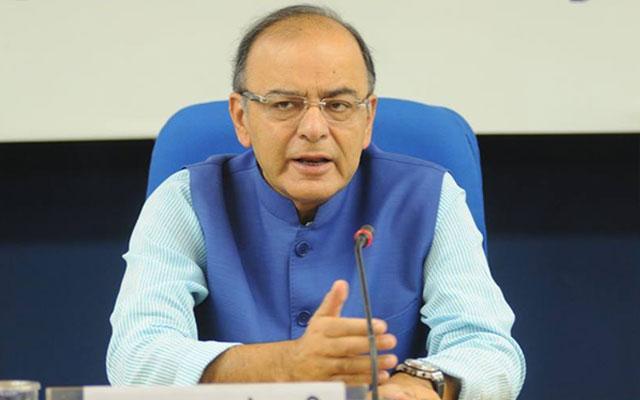Likening the Indian economy in the 21st century to the Charkravyuha legend of the Mahabharata -- the ability to enter but not exit -- the Economic Survey 2015-16 today cautioned that the country is facing adverse consequences due to the lack of a way out for failed ventures.
The Survey tabled in Parliament by Finance Minister Arun Jaitley said the government is looking to facilitate exit through a host of initiatives, including the new bankruptcy law, rehabilitation of stalled projects, proposed changes to the Prevention of Corruption Act as well as the broader JAM (Jan Dhan, Aadhaar and Mobile governance) agenda.
 "The Charkravyuha legend from the Mahabharata describes the ability to enter but not exit, with seriously adverse consequences. It is a metaphor for the workings of the Indian economy in the 21st century, the legacy of several decades of economic policy making," the Survey said.
"The Charkravyuha legend from the Mahabharata describes the ability to enter but not exit, with seriously adverse consequences. It is a metaphor for the workings of the Indian economy in the 21st century, the legacy of several decades of economic policy making," the Survey said.
India has made great strides in removing the barriers to the entry of firms, talent, and technology into the Indian economy. Less progress has been made in relation to exit.
Thus, over the course of six decades, the Indian economy moved from 'socialism with limited entry to "marketism" without exit', it added.
"Impeded exit has substantial fiscal, economic, and political costs," the document added.
Spelling out steps taken up by the government to address the issue, it said a number of solutions to facilitate exit are possible, including "new bankruptcy law, rehabilitation of stalled projects, proposed changes to the Prevention of Corruption Act as well as the broader JAM agenda.
These hold "the promise of facilitating exit, and providing a significant boost to long-run efficiency and growth", it added.
Elaborating on the magnitude of the problem emanating from difficulty to exit, the survey said there is not much of a gap between surviving firms and unproductive ones in India contrary to the principle that productive and innovative firms should expand and grow, forcing out the unproductive ones.
"In the US the average 40-year old plant is eight times larger (in terms of employment) than a new one. Established Mexican firms are twice as large as new firms. But in 2010 India the average 40 year old plant was only 1.5 times larger than a new one," it said.
Stating that the situation has worsened over the years in India, it said there are not enough big firms and too many firms that are unable to grow, the latter suggesting that there are problems of exit.
With start up becoming the flavour of the season, the survey said it is important that start ups too see "exit" which could take the form of these companies being listed, allowing the original private investors to cash in on the initial investment and plough it back into other similar ventures.
"Exit valuations in India are still low but are expected to increase as the impact of new SEBI policies on listings comes into effect and as equity markets in general revive from current low valuations caused by a sense of gloom in the global economy," it said.
Highlighting the fiscal cost of impeded exit, the Economic Survey 2015-16 said it is an "increasing function of the taxes that will have to make up for the lost revenue, and/or the general equilibrium effects of greater deficits, via the greater interest costs and reduced private sector investment activity that result if the government borrows to finance the foregone revenue."
On the economic cost, it said in a capital scarce country such as India, mis-allocation of resources can have significant costs. Another cost, in the current context, stems from the overhang of stressed assets on corporate and bank balance sheets.
"It reflects the difficulty of apportioning costs of past mistakes between equity holders, creditors, taxpayers and consumers. The consequence is a reduced flow of new investment, dampening medium term growth," the survey said.
Stating that the lack of exit can also have considerable political costs for governments attempting to reform the economy, it said: "Benefits of impeded exit often flow to the rich and influential in the form of support for 'sick' firm."
This can give the impression that governments favour large corporates, which politically limits the ability to undertake measures that will benefit the economy but might be seen as further benefiting business.
"Similarly, if wilful defaulters cannot be dealt with appropriately, the legitimacy of a market economy and the regulating institutions can themselves be called into question," it said.
On measures to address the problem it said one of steps in vast parts of the economy has been to promote competition via private sector entry rather than change ownership through privatisation.
Listing out direct policy action as another way, it said, "some of the problems of weak institutions can be addressed through better laws. This is why the government has introduced a new bankruptcy law that will significantly expedite exit."
It also said many of the exit problems -- in relation to fertiliser, agriculture, sugar -- can be addressed through technology and leveraging the potential of JAM.
The survey also stressed on the need to see exit as an opportunity, specially in cases of public sector firms where "resources earned from privatisation could be earmarked for employee compensation and retraining".
"Most public sector firms occupy relatively large tracts of land in desirable locations. Parts of this land can be converted into land banks and made into vehicles for promoting the 'Make in India' and Smart City campaigns," it said.
If the land is in dense urban areas, it could be used to develop eco-systems to nurture start-ups and if located in smaller towns and cities, it could be used to develop sites for industrial clusters, the survey said.
Acknowledging the concern over fear that privatisation will hurt social policies, such as reservation, it said ensuring that such policies will be maintained will be necessary to secure wider social acceptability for exit.





